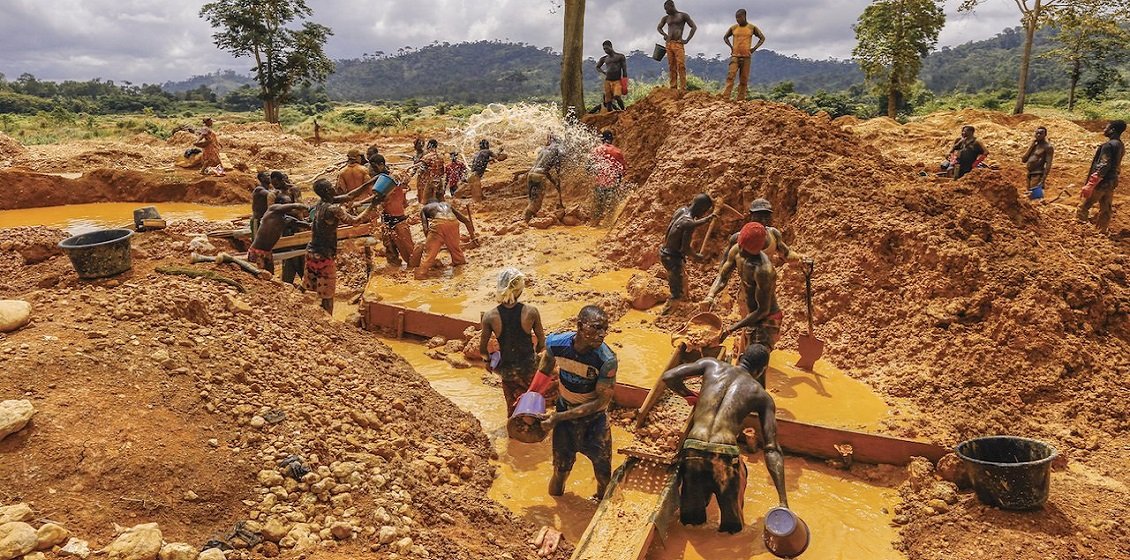Ghana is in the eye of a disaster after illegal gold mining leading to pollution, as the country faces severe environmental degradation due to rampant unregulated mining activities. Known locally as “galamsey,” this illegal gold mining has caused widespread contamination of rivers, destroyed farmland, and led to the degradation of forests, sparking outrage from both local communities and environmental organizations.
Environmental Devastation from Illegal Mining
Ghana is in the eye of a disaster after illegal gold mining leading to pollution, with major rivers such as the Pra River now severely contaminated. Artist Israel Derrick Apeti, also known as Enil Art, illustrated the devastation by using water from the polluted river to create paintings, symbolizing the extent of the environmental damage. Apeti described the water as so thick with contaminants that it could be used as paint, highlighting how far the pollution has spread.
Mercury, commonly used in the gold extraction process by miners, has been a primary cause of contamination. Mercury not only pollutes the water but also seeps into the soil, posing long-term risks to the ecosystem and public health. The charity WaterAid has described the situation as “ecocide,” warning that the unchecked use of harmful chemicals in mining is leading to irreversible damage.
Impact on Communities and Agriculture
Communities along the polluted rivers have expressed despair over the transformation of their water sources. Once clean and teeming with wildlife, these rivers have turned into toxic, discolored bodies of water, making it impossible for locals to fish or use the water for irrigation. Ghana is in the eye of a disaster after illegal gold mining leading to pollution, and farmers are among those worst affected.
The illegal mining has also taken a toll on Ghana’s agricultural sector, particularly its world-famous cocoa industry. The Ghana Cocoa Board reported that over 19,000 hectares of cocoa farmland have been destroyed due to galamsey activities. This has severely impacted cocoa production, which is critical to Ghana’s economy, as the country is the second-largest cocoa exporter in the world. The Board’s chief executive, Joseph Boahen Aidoo, acknowledged that cocoa production has been in decline due to the encroachment of illegal miners on agricultural land.
Growing Public Outcry
In response to the environmental disaster, protests have erupted in the capital, Accra, demanding government action. Demonstrators, using the hashtags #stopgalamseynow and #freethecitizens, called for an immediate halt to illegal mining and the restoration of the environment. Many activists have criticized the government for not doing enough to combat the issue, despite repeated promises to address galamsey.
As Ghana is in the eye of a disaster after illegal gold mining leading to pollution, high-profile figures have also joined the campaign to raise awareness. Music stars like Black Sherif and Stonebwoy have used their platforms to voice concern about the environmental impact of illegal mining. At a recent concert, Black Sherif showed a video of the devastation caused by galamsey, while Stonebwoy performed his song “Greedy Men,” which condemns those profiting from the destruction.
Government Response and Challenges
While President Nana Akufo-Addo has ordered the deployment of naval boats to stop mining activities in and around rivers, critics argue that enforcement has been weak. Ghana is in the eye of a disaster after illegal gold mining leading to pollution, and many believe that local businessmen, politicians, and even security personnel are complicit in the illegal mining operations, making meaningful change difficult.
According to a report by the Ghana Forestry Commission, more than 4,700 hectares of land have been destroyed by illegal mining activities, including areas within protected forest reserves. The commission has warned that if action is not taken, the country could face further environmental collapse.
Economic Drivers Behind the Crisis
The global rise in gold prices has exacerbated the problem, driving more individuals into illegal mining. Ghana, despite being rich in natural resources, is facing its worst economic crisis in decades, with rising unemployment and a high cost of living. Ghana is in the eye of a disaster after illegal gold mining leading to pollution, as many impoverished citizens see galamsey as their only means of survival. Illegal miners can earn up to 2,000 cedis ($125) a week, far more than the average monthly salary of many formal sector workers.
The gold extracted from these illegal operations is often smuggled out of the country to be sold on the international market, with countries such as China, India, and the United Arab Emirates being key destinations.
Conclusion
Ghana is in the eye of a disaster after illegal gold mining leading to pollution, with the nation facing widespread environmental destruction and social unrest. While government efforts to curb illegal mining continue, the deep-rooted economic and political challenges driving galamsey make it a difficult problem to resolve. Without immediate and sustained action, the country risks long-term damage to its environment, public health, and key industries like agriculture, leaving communities struggling to cope with the fallout.
Stay connected to know more on arcnews.online for global news like Ghana Is in the Eye of a Disaster After Illegal Gold Mining Leading to Pollution. For videos updates visit our YouTube. Do subscribe to Arcnews to get latest updates directly in your mail box.
Have A Great Day.


